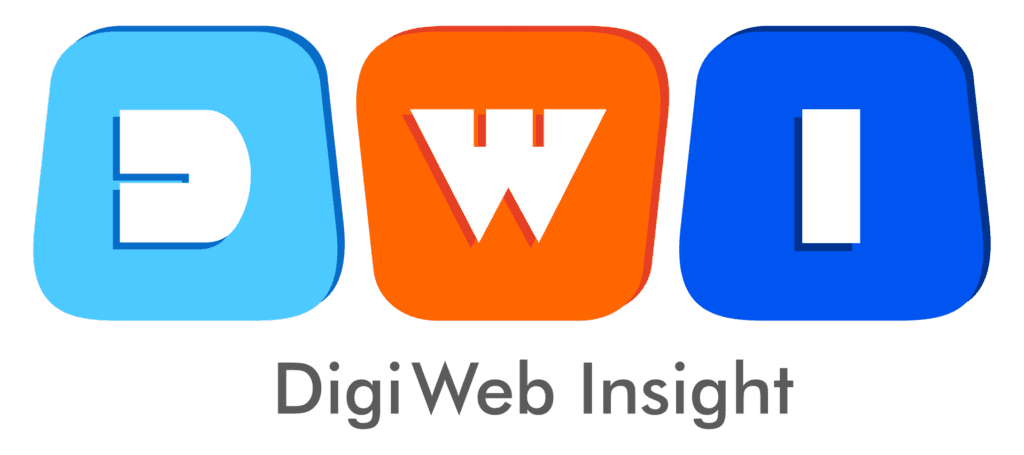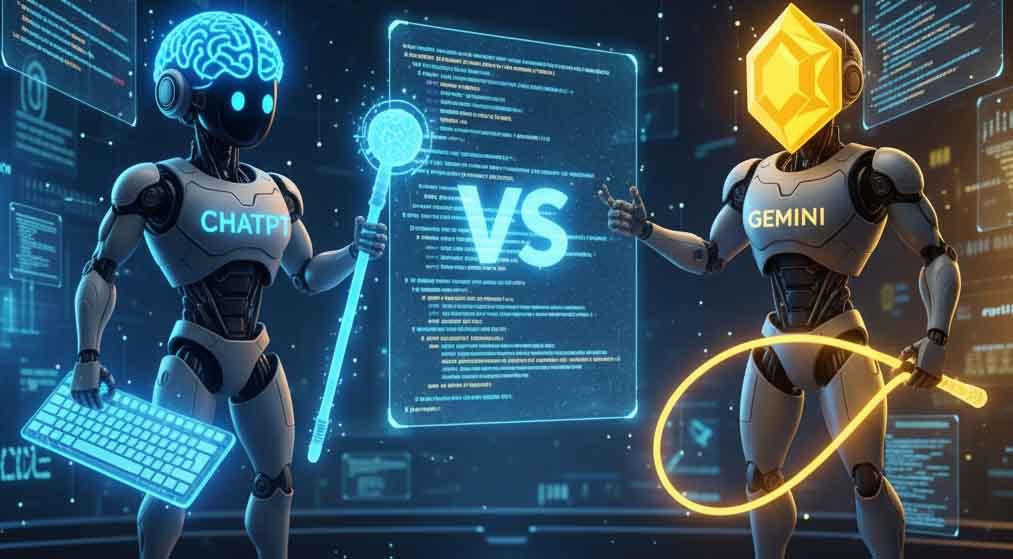In the fast-evolving landscape of software development, the most talked-about question on every developer’s mind is no longer if AI can help, but which AI does it best. The battle of ChatGPT vs Gemini for coding tasks is at the center of this revolution.
This isn’t just a friendly competition; it’s a clash of titans. On one side, we have OpenAI’s ChatGPT, the incumbent champion that introduced the world to the power of large-scale generative AI. On the other, we have Google’s Gemini, a “natively multimodal” challenger built from the ground up with a deep integration into the world’s largest search and cloud ecosystem.
For developers, IT managers, and data scientists, the choice is critical. The right AI assistant can mean the difference between spending a day debugging legacy code and solving a problem in minutes.
But which one is truly the developer’s best friend? We ran a definitive, head-to-head showdown to find the answer.
What is the Real Battle in ChatGPT vs Gemini for coding tasks?
Before we dive into the tests, we must understand the contenders. We are specifically comparing the top-tier models: ChatGPT-4o and Gemini 1.5 Pro.
- ChatGPT-4o represents the pinnacle of OpenAI’s GPT series, known for its strong logical reasoning, vast training data (up to its knowledge cutoff), and its integration into the Microsoft ecosystem, including GitHub Copilot.
- Gemini 1.5 Pro is Google’s flagship, boasting a massive 1 million token context window. This isn’t just a party trick; it means Gemini can analyze and understand entire codebases, repositories, or multiple large documentation files at once.
The true test of ChatGPT versus Gemini for coding tasks isn’t about simple “Hello, World!” scripts. It’s about accuracy, efficiency, context-awareness, and real-world integration.
The 5-Round Showdown: A Head-to-Head Test
To settle the score, we designed five real-world scenarios that developers face every single day. Here are the shocking, in-depth results.
| Coding Task | Winner | Why It Won |
| Round 1: Raw Code Generation | Gemini | Generated more complete, modern code with better error handling. |
| Round 2: Complex Algorithm Logic | ChatGPT | Better at reasoning through abstract, math-heavy problems. |
| Round 3: Debugging & Code Fixing | Tie | Both were exceptional, but in different ways. |
| Round 4: Code Translation | Gemini | More accurate and idiomatic translation between languages. |
| Round 5: Ecosystem Integration | (Depends) | ChatGPT for Microsoft/GitHub; Gemini for Google/Android. |
Round 1: Raw Code Generation (Python & JavaScript)
Our first test was straightforward. We asked both models to generate a common boilerplate task: a small web service.
The Prompt: “Create a simple Python Flask API with one POST endpoint ‘/users’ that accepts a JSON object with ‘name’ and ’email’, validates the email format with regex, and returns a JSON response with a ‘user_id’ and a ‘status: created’ message. Include basic error handling for bad requests.”
ChatGPT-4o’s Output & Analysis
ChatGPT immediately produced clean, functional code. It used the re library for regex validation and provided the core app.route() structure. It was fast, accurate, and the code worked on the first try.
However, the error handling was minimal. It included a generic 400 Bad Request but didn’t specify why the request was bad (e.g., “Invalid email format” vs. “Missing ‘name’ field”).
Gemini 1.5 Pro’s Output & Analysis
Gemini’s output was slightly more verbose, and in a good way. It not only provided the Flask app but also included a requirements.txt file and a small comment block explaining the regex pattern it chose.
The key difference was the error handling. Gemini’s code was more robust, providing specific JSON error messages like {'error': 'Invalid email format'}. This is a best practice that saves significant time in development.
Winner: Gemini. While both were functional, Gemini’s output was more “production-ready” and thoughtful, demonstrating a deeper understanding of a developer’s end-to-end needs.
Round 2: Complex Logic & Algorithm Implementation
Next, we moved from boilerplate to brains. We wanted to see which AI could handle abstract logic, a common task in data science and systems engineering.
The Prompt: “Implement a parallel QuickSort algorithm in Python using the ‘multiprocessing’ library. The function should take a list of integers and the number of processes to use. Add comments explaining the partitioning logic and process management.”
ChatGPT-4o’s Output & Analysis
ChatGPT shined here. It correctly identified that true parallelization in QuickSort is non-trivial and often involves a threshold for switching back to a serial sort to avoid process overhead.
Its code was well-structured, and the comments were incredibly clear, explaining why it was using a specific partitioning strategy. It demonstrated a strong “computer science” foundation, reasoning through the problem like a seasoned programmer.
Gemini 1.5 Pro’s Output & Analysis
Gemini’s first attempt was also functional but less optimized. It created parallel processes for every single partition, a technically correct but highly inefficient approach that would be slow in a real-world scenario.
It took a follow-up prompt (“This seems inefficient. Can you optimize it?”) for Gemini to produce a solution similar to ChatGPT’s.
Winner: ChatGPT. In this round of ChatGPT vs Gemini for coding tasks, ChatGPT proved superior in pure algorithmic reasoning and abstract problem-solving.
Round 3: Debugging and Code Analysis
This is the bread and butter for any AI coding assistant. We provided a buggy 100-line JavaScript snippet with a subtle “off-by-one” error in a for loop and a null reference exception.
The Prompt: “Find and fix the bugs in this JavaScript code. The ‘calculateTotal’ function is returning the wrong amount and it sometimes crashes on the ‘userList’ array.”
ChatGPT-4o’s Output & Analysis
ChatGPT was like a scalpel. It immediately identified both bugs. It said, “The ‘off-by-one’ error is here in your for loop (line 74), which should be i < array.length, not i <= array.length.”
It also added, “Furthermore, your userList loop on line 32 does not check if a user object is null before trying to access user.name, causing a crash. You should add a null check.” It provided the two exact, minimal fixes.
Gemini 1.5 Pro’s Output & Analysis
Gemini also found both bugs. However, its approach was different. Instead of just “fixing” the code, it offered to refactor it.
It said, “I have fixed the two bugs. However, this entire module could be modernized. The for loop can be replaced with a more idiomatic .reduce() method, and the userList loop can be safer using optional chaining (user?.name).” It then provided a fully refactored, more modern version of the code.
Winner: Tie. This reveals a difference in philosophy. ChatGPT is the perfect debugger—it finds and fixes the error you ask for. Gemini is the perfect code-review partner—it finds the error, fixes it, and teaches you how to write better code.
Round 4: Code Translation & Modernization
For our next test, we focused on legacy code, a painful reality for many IT departments.
The Prompt: “Here is a 300-line C# class from a .NET 2.0 application. Translate this class to modern Python 3.12, ensuring the logic is ‘Pythonic’ and uses modern libraries like ‘requests’ instead of ‘WebRequest’.”
ChatGPT-4o’s Output & Analysis
ChatGPT did a literal, line-by-line translation. It was accurate, but the resulting Python code felt like C#. It used C#-style class structures and method names. It correctly identified WebRequest and swapped it for requests, which was good. But the code wasn’t “Pythonic,” a key part of the prompt.
Gemini 1.5 Pro’s Output & Analysis
Gemini’s massive context window was the clear star here. It analyzed the entire 300-line class and understood its purpose.
Instead of a literal translation, it produced a new Python module that was truly “Pythonic.” It used list comprehensions, converted C# properties into Python @property decorators, and used dataclasses where appropriate. It wasn’t just a translation; it was a refactor.
Winner: Gemini. This was a landslide victory for Gemini. Its ability to understand the intent of an entire file and rewrite it idiomatically for a new language is a game-changer for modernizing legacy systems.
Round 5: Ecosystem & Integration (The “Real-World” Test)
The final test of ChatGPT v/s Gemini for coding tasks isn’t about a single prompt. It’s about where these tools live.
ChatGPT: The Microsoft & GitHub Universe
ChatGPT’s power is amplified by its deep integration. Through Microsoft, it’s the brain behind GitHub Copilot, the world’s most popular code completion tool. It lives directly in Visual Studio Code, in Azure, and in Office.
If your workflow is already built on GitHub and Microsoft tools, ChatGPT is not just an assistant; it’s part of the furniture. It’s a seamless, ever-present partner. For more, see our guide on how to use generative AI in your workflow.
Gemini: The Google & Cloud Universe
Gemini’s integration is just as powerful, but in a different ecosystem. It’s built directly into Google Cloud Platform (GCP), Firebase, and Android Studio.
For an Android developer, Gemini can analyze your entire project, find permissions issues, and update your Gradle files. For a data scientist in Google’s ecosystem, Gemini can write and execute Python code directly in Google Colab and query BigQuery.
Winner: It depends entirely on your stack. This isn’t a cop-out; it’s the most important factor. The best AI is the one that’s already in your tools.
The Final Verdict: Who Wins the ChatGPT vs Gemini for coding tasks Battle?
After this ultimate showdown, the answer is clear: there is no single winner. The winner is the developer who knows which tool to use for the right task.
This battle of ChatGPT vs Gemini for coding tasks is one of nuance.
You should use ChatGPT-4o if:
- You are a student, researcher, or engineer focused on complex algorithms and pure computer science.
- Your workflow is heavily dependent on the Microsoft/GitHub ecosystem.
- You need a precise, fast, and highly logical debugger to find and fix specific problems.
You should use Gemini 1.5 Pro if:
- You are a professional developer working with large, existing codebases or legacy systems.
- Your primary need is refactoring, modernizing, or translating code between languages.
- You are deeply integrated into the Google Cloud, Android, or Google Workspace ecosystem.
Ultimately, the smartest developers won’t choose one. They will use both, leveraging ChatGPT’s abstract reasoning and Gemini’s massive context and refactoring power. The future of software development isn’t just using AI; it’s knowing how to build your own hybrid toolkit for success.
For more insights on the future of tech, check out our other IT and AI articles.

